CNC machining services forUSA
Get tailored, top-tier parts delivered fast
Our CNC machining services, in USA , makes quality parts for your needs.

DongGuan ChengYang is a premier provider of CNC machining services for Illinois. With our state-of-the-art machinery and skilled technicians, we are able to offer precision machining services tailored to meet the unique needs of our clients in Illinois. Our commitment to quality and customer satisfaction sets us apart from other machining service providers in the industry.
At DongGuan ChengYang, we understand the importance of delivering high-quality products on time and within budget. That is why we strive to exceed our clients' expectations by consistently delivering superior CNC machining services for Illinois. Whether you need prototypes, small batches, or large-scale production runs, we have the capabilities to meet your needs with efficiency and accuracy.
We take pride in our reputation as a trusted partner for CNC machining services in Illinois. Our dedication to excellence and continuous improvement ensures that our clients receive the best possible service and products. Contact DongGuan ChengYang today to experience the difference our machining services can make for your next project.
CNC Machining services
Dongguan C.Y. are equipped with 3-axis, 4-axis, and 5-axis CNC milling machines, enables us to productively handle parts ranging from easy to complicated.
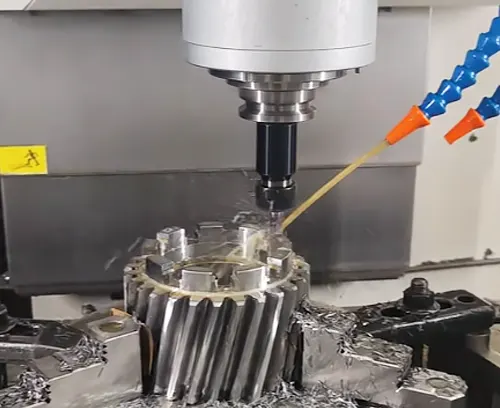
CNC Milling
Machining with precision using CNC equipment, delivering dependable parts quickly for our customers.
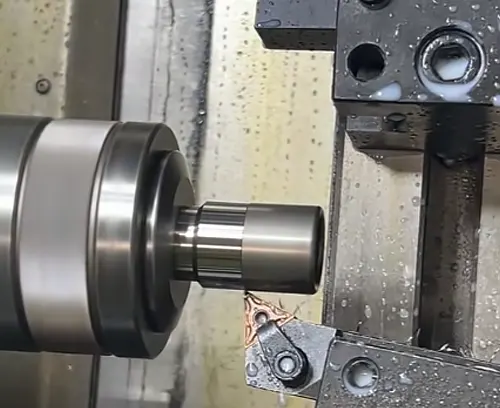
CNC Turnning
Our CNC lathes, turning centers, and mill-turn equipment enable us withpresicion to construct a broad range of components for every end user.
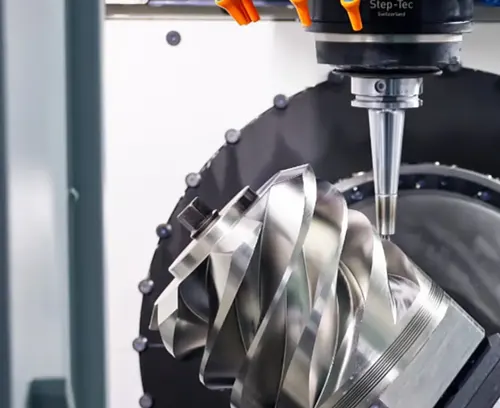
5 Axis CNC Milling
Equip with 5-axis machining solutions for intricate and precision-engineered components. Featuring rapid machining, it's perfect for exquisite designs.
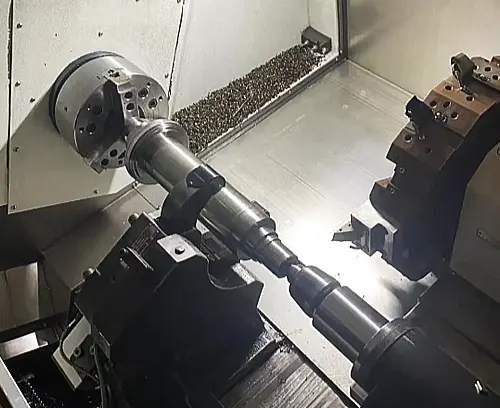
Precision Machining
Ensure precision-driven fabrication by aligning different manufacturing stages to boost performance, exactness, and shorten lead times, guaranteeing reliable, high-quality output.
Capabilities
Maximum Dimensions
2000mm x 1500mm x 800mm or 78.7 x 59 x 31.5 inches.
Maximum Dimensions
2000mm x 1500mm x 800mm or 78.7 x 59 x 31.5 inches.
Support Threading
Prefer Metric Threads, Also Support UNC and UNF threads.
Wall Thickness
Generally, a workable minimum wall thickness is 0.5mm for metals and 1.0mm for plastics.
Material Available
Metals: Aluminum, Copper, Brass, Bronze, Stainless Steel, Carbon Steel, Steel Alloy, Titanium, and plastic, etc .
Tolerances
Dimension: Depends on the size and material, generally +/- 0.01mm or 0.0004 inches
Common CNC DFM
DFM encourages collaboration between design and manufacturing teams to prevent downstream issues.

Sharp Corner

Undercut

Undercut

Thick Walls

Tolerance Guide

Small Hole

Narrow Area
Metal Materials
We offer instant quotes for over 100 metals and help compare processing material costs.Compare material processing costs and get real-time quotes on 100+ metal options.
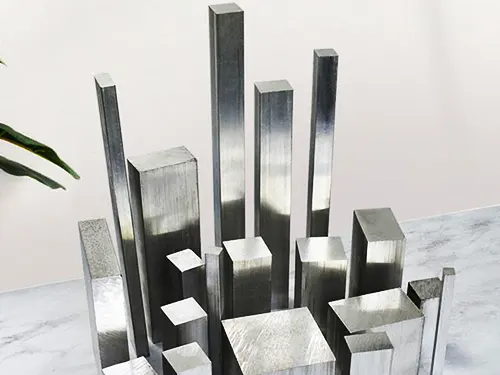
Aluminum
Aluminum is a versatile material used in CNC machining for its excellent strength-to-weight ratio, corrosion resistance, and ease of machinability. Common types of aluminum materials used in CNC machining include 6061, known for its high strength and weldability; 7075, a high-strength alloy often used in aerospace applications; and 2024, valued for its good machinability and fatigue resistance. Other popular aluminum alloys used in CNC machining are 5052, 5083, and 6063. These materials offer a wide range of mechanical properties that can be tailored to specific requirements, making aluminum a preferred choice for a variety of CNC machining projects.
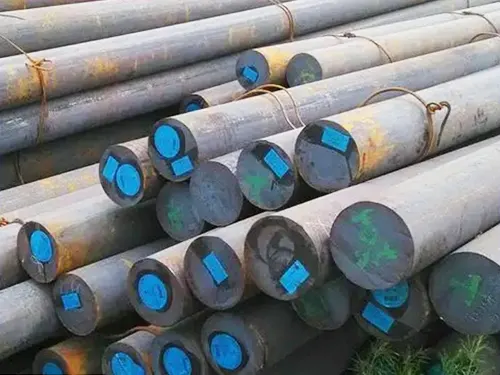
Carbon Steel
Carbon steel is a popular material used in CNC machining due to its high strength and durability. It is an alloy of iron and carbon, with other elements such as manganese, silicon, and copper added to enhance its properties. Common types of carbon steel used in CNC machining include low carbon steel (mild steel), medium carbon steel, and high carbon steel. Low carbon steel is the most common type, offering good machinability and weldability. Medium carbon steel is stronger and harder, making it suitable for parts that require more wear resistance. High carbon steel, on the other hand, has the highest strength and hardness, but it can be more challenging to machine. Overall, carbon steel is a versatile material for CNC machining, offering a balance of strength, durability, and cost-effectiveness.
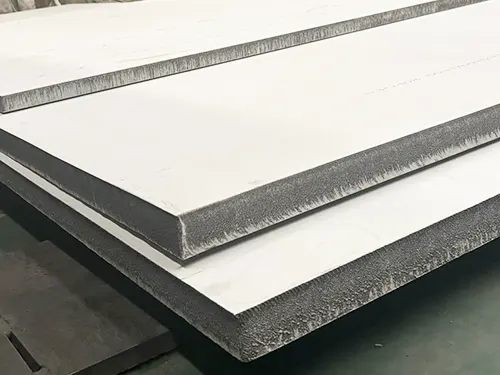
Stainless Steel
Stainless steel is a popular material used in CNC machining due to its excellent strength, durability, and corrosion resistance. It is composed of iron, chromium, nickel, and other elements that provide it with its unique properties. Some common types of stainless steel used in CNC machining include 304, 316, and 17-4 PH. 304 stainless steel is the most widely used type, known for its versatility and corrosion resistance. 316 stainless steel offers even greater resistance to corrosion and is ideal for applications involving exposure to harsh chemicals or saltwater. 17-4 PH stainless steel combines high strength with good corrosion resistance, making it a popular choice for industries requiring a durable and reliable material for CNC machining.
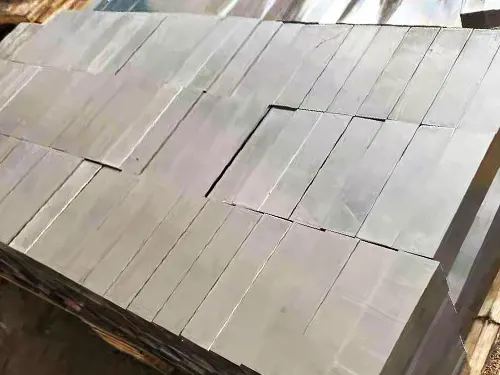
Tool Steel
Tool steel is a type of carbon and alloy steel that is specifically designed to be used in the production of cutting tools, molds, and dies for CNC machining. It is known for its exceptional hardness, abrasion resistance, and ability to maintain a sharp cutting edge even at high temperatures. Some common types of tool steel used in CNC machining include D2, A2, O1, and H13. D2 tool steel is a high-carbon, high-chromium steel known for its excellent wear resistance and toughness. A2 tool steel is an air-hardening tool steel known for its deep hardening properties. O1 tool steel is a general-purpose oil-hardening steel known for its good wear resistance and toughness. H13 tool steel is a hot-work tool steel known for its high toughness and resistance to thermal fatigue.
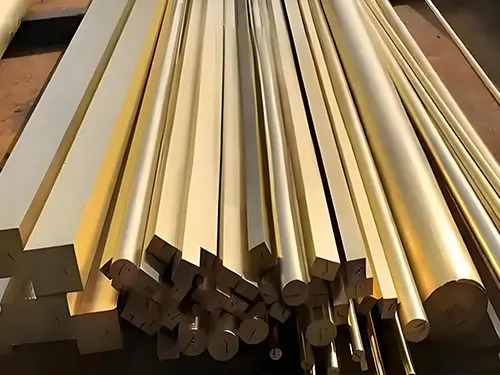
Brass
Brass is a widely used material in CNC machining due to its excellent machinability, corrosion resistance, and attractive appearance. It is a metal alloy primarily composed of copper and zinc, with small amounts of other elements such as lead, tin, and aluminum. Common types of brass materials used in CNC machining include C36000 (Free Cutting Brass), C46400 (Naval Brass), C26000 (Cartridge Brass), and C38500 (Architectural Bronze). Each type of brass has its own unique properties and is chosen based on the specific requirements of the project. In CNC machining, brass is often used for producing intricate and detailed parts for various industries such as automotive, aerospace, and electronics.
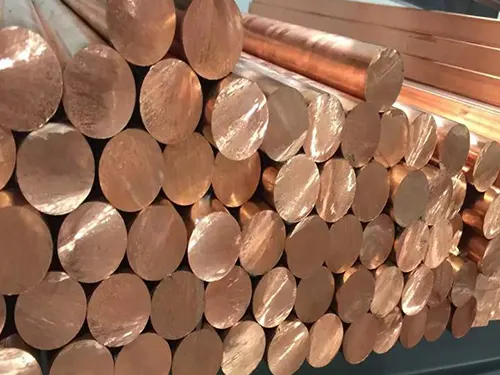
Copper
In CNC machining, Cooper is a widely used material due to its excellent conductivity and corrosion resistance. It is commonly used for producing electrical components, heat exchangers, and various parts in the aerospace industry. Some common types of materials used for CNC machining include aluminum, stainless steel, brass, and titanium. Aluminum is known for its lightweight yet strong properties, making it suitable for a wide range of applications. Stainless steel is highly durable and resistant to corrosion, making it ideal for components that require strength and longevity. Brass is often chosen for its attractive appearance and ease of machining, while titanium is valued for its high strength-to-weight ratio and biocompatibility. These materials offer a variety of options for CNC machining projects, depending on the desired characteristics of the final product.
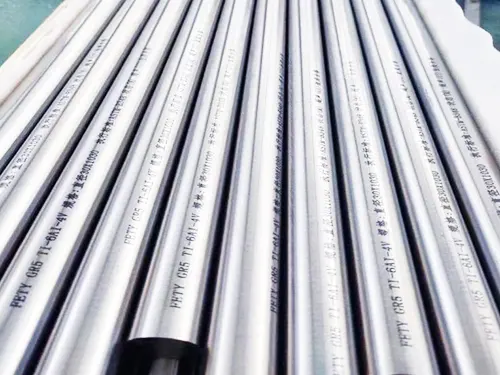
Titanium
Titanium is a popular material used in CNC machining due to its excellent strength-to-weight ratio, corrosion resistance, and biocompatibility. Common types of titanium alloys used in CNC machining include Grade 2, Grade 5 (Ti-6Al-4V), and Grade 23 (Ti-6Al-4V ELI). Grade 2 is the most commercially pure titanium and is often used in industries such as aerospace and medical devices. Grade 5 is a titanium alloy with high strength and is commonly used in aerospace applications. Grade 23 is a medical grade titanium alloy that is often used in medical implants and surgical instruments. These types of titanium materials are preferred choices for CNC machining due to their exceptional properties and versatility.
Plastic Materials
We offer instant quotes for over 200 plastics and help compare processing material costs.
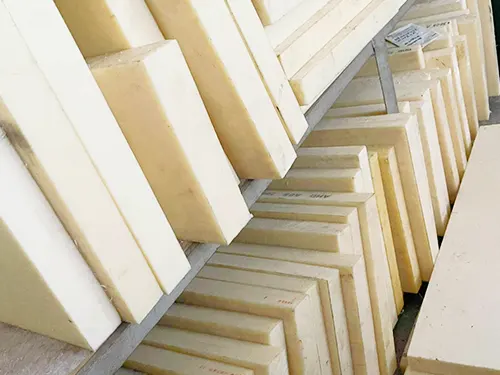
ABS
ABS, or Acrylonitrile Butadiene Styrene, is a common thermoplastic polymer used in CNC machining. It is known for its high strength, durability, and heat resistance, making it ideal for a wide range of industrial applications. One of the main advantages of ABS is its ease of machining, as it can be cut, drilled, and milled with relative ease. Additionally, ABS has good chemical resistance and can be easily painted or glued. However, ABS can be prone to warping during the machining process, which can affect the overall dimensional accuracy of the final product. It also tends to produce fumes when machined, so proper ventilation is necessary. Despite these drawbacks, ABS remains a popular choice for CNC machining due to its overall performance and versatility.
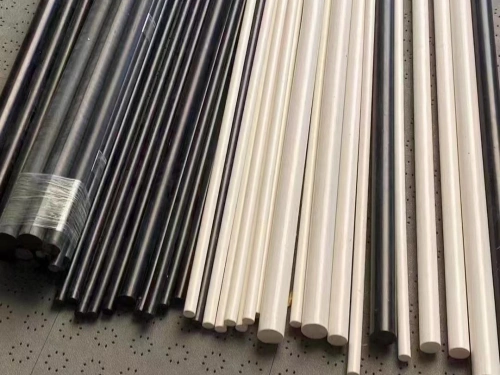
PMMA
PMMA, also known as acrylic or plexiglass, is a popular material used in CNC machining. Its advantages include high transparency, chemical resistance, and ease of machining. PMMA is lightweight and can be easily molded into different shapes, making it a versatile option for various applications. However, one major disadvantage of PMMA is its brittleness, which makes it prone to cracking or breaking under stress. Additionally, PMMA can be more expensive compared to other materials like ABS or PVC. Despite its drawbacks, PMMA remains a preferred choice for CNC machining due to its aesthetic appeal and durability. Overall, PMMA is a reliable material for creating precision parts and prototypes in various industries.
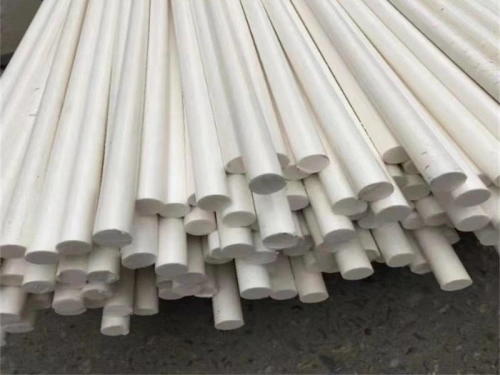
PE
PE (or Programmed Engineering) for CNC machining refers to the process of creating detailed instructions for a CNC (Computer Numerical Control) machine to follow in order to produce a specific part or product. The advantage of using PE for CNC machining is that it allows for precise and complex designs to be manufactured with a high level of accuracy and consistency. This can result in faster production times and reduced waste of materials. However, the disadvantage of using PE for CNC machining is that it requires skilled programmers to create and input the instructions, which can be time-consuming and costly. Additionally, any errors in the programming can lead to faulty parts being produced, causing delays and additional costs.
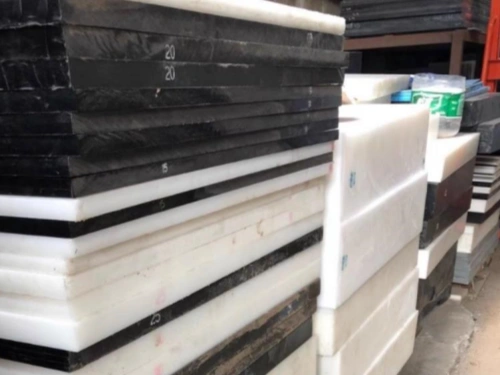
Nylon
Nylon is a commonly used material in CNC machining due to its versatility and durability. It is a thermoplastic that can be easily machined into complex shapes, making it ideal for a variety of applications. One of the main advantages of Nylon for CNC machining is its high strength-to-weight ratio, which allows for lightweight parts that are still incredibly strong. Additionally, Nylon is resistant to abrasion, making it suitable for parts that experience wear and tear. However, one of the main disadvantages of Nylon is its tendency to absorb moisture, which can affect its dimensional stability and mechanical properties. This can be mitigated by using Nylon with additives to reduce moisture absorption, but it is still something to consider when choosing a material for CNC machining.
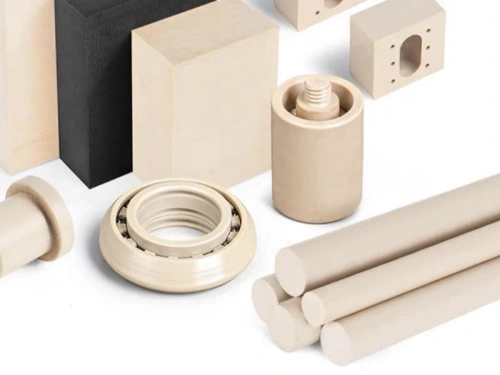
PEEK
PEEK, or Polyether Ether Ketone, is a high-performance thermoplastic material that is widely used in CNC machining. It is known for its excellent mechanical properties, high temperature resistance, chemical resistance, and wear resistance. PEEK is often chosen for applications that require durability and reliability in extreme conditions. In CNC machining, PEEK can be easily machined to tight tolerances with high surface finishes, making it a popular choice for precision parts. However, PEEK is also known for being a challenging material to work with due to its high melting point, which can lead to tool wear and longer machining times. Additionally, PEEK is a relatively expensive material compared to other thermoplastics, which can impact the overall cost of manufacturing parts.
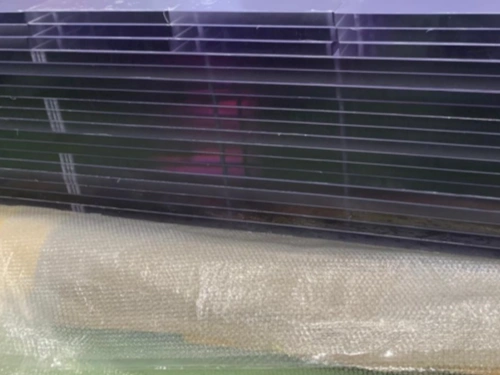
PC
PC for CNC machining, also known as Personal Computer Numerical Control, is a software-based control system that allows users to program and operate CNC machines from a personal computer. One of the key advantages of using a PC for CNC machining is its flexibility and ease of use. With PC-based control systems, operators can easily create and edit machining programs without the need for specialized training. Additionally, PC control systems typically offer advanced features like real-time monitoring and data analysis, improving overall efficiency and productivity in the machining process. However, a potential disadvantage of using a PC for CNC machining is the risk of system crashes or software malfunctions, which can lead to downtime and production delays. It is crucial for operators to have a backup plan in case of technical issues to minimize disruption to the manufacturing process.
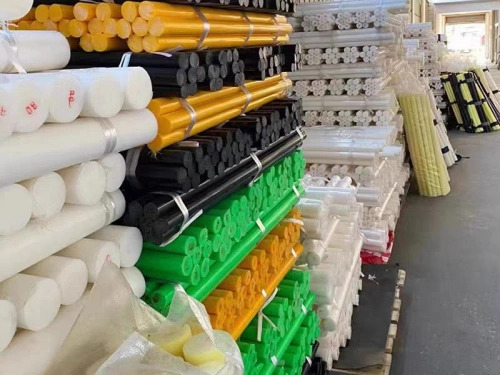
PP
PP (short for Polypropylene) is a popular material used in CNC machining due to its versatility and cost-effectiveness. One of the main advantages of using PP for CNC machining is its excellent chemical resistance, making it suitable for a wide range of industrial applications. PP is also known for its high tensile strength and durability, ensuring long-lasting and reliable parts. However, one of the main disadvantages of PP is its poor resistance to UV light, which can cause it to degrade over time when exposed to sunlight. Additionally, PP has a relatively low melting point compared to other materials, so it may not be suitable for high-temperature applications. Despite these drawbacks, PP remains a popular choice for CNC machining due to its overall performance and affordability.
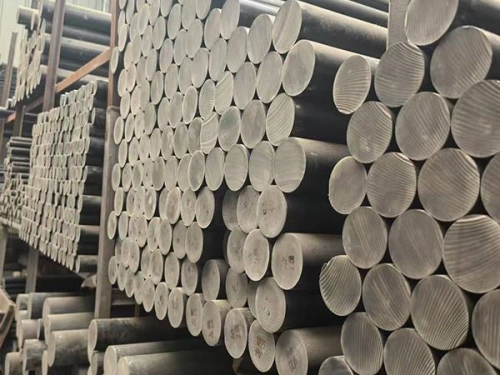
PET
PET, or Polyethylene terephthalate, is a type of plastic material commonly used in CNC machining. One advantage of using PET for CNC machining is its excellent dimensional stability, which ensures precise and accurate machining. Additionally, PET is known for its high strength and durability, making it suitable for a wide range of applications. On the other hand, a disadvantage of PET is its tendency to wear down cutting tools quickly due to its hardness. This can lead to increased tooling costs and slower machining speeds. Despite this drawback, PET remains a popular choice for CNC machining due to its overall performance and quality results.
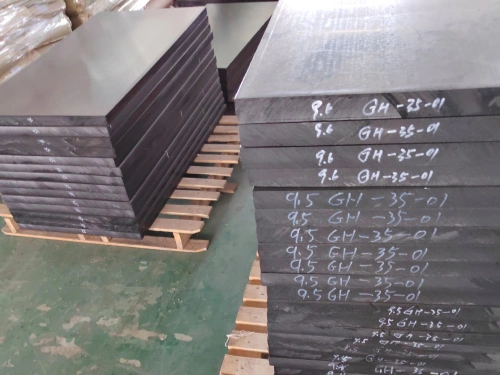
POM
POM, which stands for Programmatic Object Model, is a vital component in CNC machining. It refers to the software-driven instructions that dictate how a machine will function during the manufacturing process. One of the key advantages of POM for CNC machining is its ability to automate tasks, leading to increased efficiency and accuracy in production. Additionally, POM allows for greater control over the machining process, resulting in consistent quality of finished products. However, a potential disadvantage of POM is its complexity and reliance on software, which may require additional training and resources to implement effectively. Overall, POM for CNC machining offers numerous benefits for manufacturers seeking to optimize their production processes.
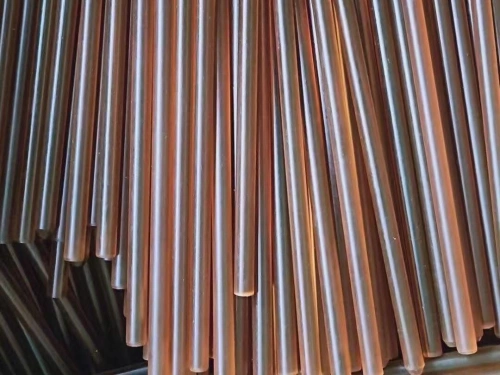
PVC
PVC, or polyvinyl chloride, is a popular material used in CNC machining due to its affordability and versatility. Its advantages include high strength and durability, making it suitable for a wide range of applications. PVC is also easy to machine and can be shaped into complex designs with precision. However, PVC does have some disadvantages. It is not as heat resistant as other materials, limiting its use in high temperature environments. PVC also releases toxic fumes when heated, requiring proper ventilation when machining. Despite these drawbacks, PVC remains a popular choice for CNC machining due to its cost-effectiveness and ease of use.
Surface Finishes
Our experts bring years of experience in delivering precise surface treatments.
| Name | Description | Materials | Color | Texture | More |
|---|---|---|---|---|---|
| Brushing | Brushing is an essential oral hygiene practice that involves using a toothbrush with toothpaste to clean the teeth and gums. It helps remove plaque, prevent tooth decay, and maintain fresh breath. |
Aluminum, Brass, Stainless Steel, Steel, ABS,etc | N/A | Satin | |
| Sand Blast | Sandblast is a powerful tool used in the industrial world for cleaning surfaces or removing material through abrasive particles propelled at high speeds by air or water. It is commonly used in various industries for surface preparation or restoration purposes. |
All Metal Materials, Plastic | N/A | Matte | |
| Tumbling | Tumbling is a form of gymnastics that involves performing acrobatic skills such as flips, somersaults, and twists. It requires strength, flexibility, and coordination. Tumbling can be done on a floor mat or a spring floor. |
All Materials | N/A | Smooth, Matte | |
| Polishing | Polishing is a process of smoothing and refining a surface to enhance its appearance and shine. It involves using abrasive materials or chemicals to remove imperfections and create a smooth, glossy finish. |
All Materials | N/A | Smooth | |
| Anodizing | Anodizing is an electrochemical process that enhances the corrosion resistance and durability of metals such as aluminum. By forming a protective oxide layer on the surface, anodizing also provides a decorative finish. |
Aluminum, Titanium | Clear, Yellow, Green, Blue, Black, etc |
Smooth, matte finish. | |
| Painting | Painting is a visual art form where colors and pigments are applied on a surface to create a unique composition. It is a form of expression that can convey emotions, ideas, or tell a story. |
All Materials | Clear, Yellow, Green, Blue, Black, Multiple | Gloss, semi-gloss, flat, metallic, textured | |
| Black Oxide | Black oxide is a chemical process used to create a corrosion-resistant finish on ferrous metals. It involves immersing the metal in an alkaline solution at high temperatures, which creates a black coating. This coating not only protects the metal from rust but also enhances its appearance. |
Steel, Stainless Steel | Black | Smooth, matte | |
| Electroplating | Electroplating is a process that involves the deposition of a thin layer of metal onto a surface through the use of electricity. It is commonly used to enhance the appearance, corrosion resistance, and conductivity of various objects. |
Aluminum, Steel, Stainless Steel | Gold, Silver, Nickel, Copper, Brass, Zinc, Chrome | Smooth, glossy finish | |
| Powder Coating | Powder coating is a dry finishing process where a mixture of finely ground particles of pigment and resin is electrostatically sprayed onto a surface. The coated surface is then cured in an oven, creating a durable and attractive finish. |
Aluminum, Stainless Steel, Steel,etc | Custom | Gloss, matte or semi-gloss | |
| Alodine | Alodine, also known as chemical conversion coating, is a metal pre-treatment process used to improve corrosion resistance and paint adhesion on aluminum and other metals. It creates a protective barrier that extends the lifespan of the material. |
Aluminum, Stainess Steel | Clear, Gold | As machined | |
| Passivation | Passivation is a chemical process that increases the resistance of a metal against corrosion. It involves the formation of a protective layer on the metal's surface, making it less susceptible to environmental damage. |
Stainess Steel | N/A | Matte | |
| Electroless Plating | Electroless plating is a process used to deposit a metal coating on a substrate without the use of an external electrical current. The process relies on the chemical reaction between the metal ions in the plating solution and the surface of the substrate. This method ensures uniform coating thicknesses and coverage, making it ideal for industries such as automotive, electronics, and aerospace. |
Metal, Plastic | Gold, Silver, Nickel, Copper, Brass, Zinc, Chrome | Smooth, glossy finish |
Gallery Parts
CNC machining services Locations Near Illinois, USA
We have experts with years of experience in delivering top-tier product surface treatments.
FAQ
Here, some of the most common questions about CNC machining services for Illinois, USA. ” free to contact us if you have any question.”
Introduction
CNC machining services are crucial for businesses looking to produce high-quality precision parts efficiently. In Illinois, USA, there are numerous companies offering these services to meet the needs of various industries. To help you better understand CNC machining services in Illinois, we have compiled a list of 10 frequently asked questions and their answers.
Q: What is CNC machining?
A: CNC machining is a manufacturing process that uses pre-programmed computer software to control the movement of machinery and tools to create custom parts and components.
Q: What industries can benefit from CNC machining services in Illinois?
A: Industries such as aerospace, automotive, medical, and electronics can benefit from CNC machining services in Illinois.
Q: How do I choose the right CNC machining service provider in Illinois?
A: Look for a company with a proven track record of delivering high-quality parts, modern equipment, experienced staff, and excellent customer service.
Q: Can CNC machining services in Illinois handle large production orders?
A: Yes, many CNC machining service providers in Illinois have the capability to handle large production orders efficiently.
Q: What materials can be used in CNC machining services in Illinois?
A: CNC machining services in Illinois can work with materials such as aluminum, steel, brass, and plastics.
Q: How long does it take to receive parts from CNC machining services in Illinois?
A: The turnaround time for parts will vary depending on the complexity of the project and the capacity of the CNC machining service provider.
Q: Are CNC machining services in Illinois cost-effective?
A: Yes, CNC machining services in Illinois can be cost-effective for businesses looking to produce high-quality parts in a timely manner.
Q: Can CNC machining services in Illinois help with design improvements?
A: Some CNC machining service providers in Illinois offer design consultation services to help improve part design for better functionality and manufacturability.
Q: What quality control measures are in place for CNC machining services in Illinois?
A: Many CNC machining service providers in Illinois have strict quality control measures in place to ensure the accuracy and consistency of parts produced.
Q: How can I request a quote for CNC machining services in Illinois?
A: Most CNC machining service providers in Illinois have online forms or contact information on their websites where you can request a quote for your project.
Conclusion
Understanding the ins and outs of CNC machining services in Illinois is crucial for businesses looking to partner with the right service provider. By addressing these 10 frequently asked questions, we hope to provide you with the information you need to make informed decisions when it comes to CNC machining services in Illinois.
